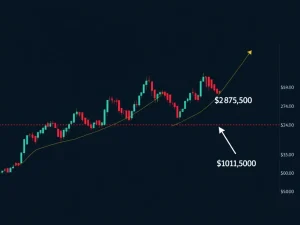Crippling Japan Crypto Regulation Drives Urgent Liquidity Exodus Offshore

In the rapidly evolving world of cryptocurrencies, agility is key. While many nations are racing to establish themselves as global digital finance hubs, Japan, despite its technological prowess, faces a significant challenge. Experts are sounding the alarm: the nation’s notoriously slow Japan crypto regulation processes are not just deterring innovation, but actively driving valuable crypto liquidity and talent offshore. This isn’t merely a hiccup; it’s a systemic issue that threatens to undermine Japan’s position in the global digital asset landscape.
Why is Japan Crypto Regulation Lagging Behind Global Trends?
Japan’s regulatory framework, while aiming for stability and consumer protection, is increasingly viewed as a bottleneck. Maksym Sakharov, co-founder and CEO of Web3 firm WeFi, points out that it’s not the proposed tax policies, but rather Japan’s ‘slow, prescriptive, and risk-averse’ approval culture that’s the primary culprit [1].
- Bureaucratic Bottleneck: The current two-step regulatory framework involves initial review by the Japan Virtual and Crypto Assets Exchange Association (JVCEA) and final oversight by the Financial Services Agency (FSA). This process can drag go-to-market timelines to an agonizing 6–12 months or even longer.
- Pre-Approval vs. Post-Compliance: Unlike jurisdictions focusing on ongoing obligations, Japan heavily relies on pre-approval mechanisms. This means every new token, product change, or IEO white paper often requires multiple revisions and prolonged vetting.
- Risk Aversion Over Innovation: The system is fundamentally designed to mitigate risks rather than accelerate innovation, leading to a rigid environment that struggles to adapt to the fast-paced crypto sector.
This starkly contrasts with regulatory models seen elsewhere. Singapore, for instance, maintains strict standards but offers clearer innovation pathways. The UAE prioritizes speed in approvals, attracting global fintech firms with progressive tokenization frameworks. South Korea’s Virtual Asset User Protection Act (VAUPA) focuses on ongoing obligations, enabling faster listings once certain criteria are met [1].
The Crippling Impact on Crypto Liquidity
The direct consequence of these delays is a significant drain on crypto liquidity. When Japanese teams face such prolonged approval times, their immediate solution is often to list their tokens overseas first. This ‘offshore listing’ trend has several detrimental effects:
- Erosion of Competitive Edge: By forcing domestic projects to seek foreign markets for initial listings, Japan loses the first-mover advantage and the associated capital inflows.
- Relocation of Talent and Capital: Crypto startups and liquidity providers, seeking more agile environments, are increasingly relocating their operations to jurisdictions with more adaptable frameworks, such as Singapore.
- Missed Opportunities: Critical aspects of modern crypto ecosystems, like staking and governance, often face severe hurdles due to the absence of a dynamic regulatory sandbox in Japan, further limiting the growth of domestic liquidity pools.
This exodus of capital and talent is a critical concern, threatening to undermine Japan’s potential as a global digital finance hub, especially as other nations aggressively position themselves for the future of tokenization.
Hindering Blockchain Innovation Japan’s Future
The regulatory rigidity directly impacts blockchain innovation Japan could otherwise lead. The lack of a dynamic regulatory sandbox is a major impediment to experimentation. Imagine trying to build a cutting-edge decentralized finance (DeFi) protocol or a new NFT marketplace when every small change requires months of regulatory review. This environment discourages:
- New Protocol Development: Projects requiring rapid iteration and deployment, common in Web3, find Japan’s environment stifling.
- Tokenization Experiments: While other jurisdictions like Hong Kong (with its Ensemble Sandbox) and the UAE are exploring advanced tokenization frameworks, Japan lags due to its pre-approval culture [1].
- Integration of Emerging Technologies: The slow pace makes it difficult to integrate and test new technologies like AI and advanced smart contracts within a compliant framework.
The proposed 20% flat tax on crypto gains and reclassification of digital assets as financial products, while significant, are unlikely to resolve these deeper issues without fundamental cultural reforms in regulatory processes, as Sakharov warned [1].
The Future of the Digital Asset Market in Japan
Japan boasts advanced technological infrastructure and a keen investor interest in digital assets. However, this potential may not translate into leadership in the global digital asset market if regulatory agility remains stagnant. The current landscape reflects a systemic resistance to rapid change, often rooted in hierarchical decision-making and paper-based workflows. While stability and consumer protection are undeniably essential, the current approach risks alienating entrepreneurs and capital, pushing them towards more welcoming shores.
The implications are clear: prolonged regulatory delays could permanently drive talent and capital to jurisdictions with more adaptable frameworks. This exodus threatens to undermine Japan’s potential as a global digital finance hub, particularly as other nations aggressively position themselves for the future of tokenization.
Actionable Insights for Accelerating Web3 Adoption
To reverse this trend and foster robust Web3 adoption within its borders, Japan needs proactive reforms. Sakharov suggests several key changes [1]:
- Time-Boxed, Risk-Based Approvals: Implementing a system where approvals are granted within a defined timeframe, with risk assessments guiding the process rather than endless revisions.
- Functional Regulatory Sandbox: Establishing a true sandbox environment that allows for controlled experimentation with new crypto products and services without immediate full regulatory burden. This would foster innovation while still allowing regulators to monitor risks.
- Proportional Disclosure Requirements: Streamlining disclosure requirements to be more aligned with the scale and complexity of the project, reducing the burden on smaller startups.
Beyond these, experts suggest integrating advanced technologies into the regulatory process itself. A 2025 MDPI study, for example, outlined how AI and blockchain tools could automate compliance checks and reduce bureaucratic delays [2]. Such technologies could enforce rules instantly, streamlining processes, though their specific application to crypto approvals remains an area for further exploration and implementation.
Without these critical changes, domestic crypto projects will continue to scale abroad, driven by uncertainty and prolonged wait times rather than solely by tax burdens. The time for Japan to act is now, to ensure its rightful place at the forefront of the digital finance revolution.
Frequently Asked Questions (FAQs)
What are the primary issues with Japan’s current crypto regulation?
Japan’s crypto regulation is criticized for being slow, prescriptive, and risk-averse. The two-step approval process involving JVCEA and FSA can take 6-12 months or longer, and its reliance on pre-approval mechanisms hinders rapid innovation and product deployment.
How does Japan’s regulatory approach impact crypto liquidity?
The slow approval times force Japanese crypto projects and teams to list their tokens and operations overseas, leading to a significant outflow of crypto liquidity. This erodes Japan’s competitive edge and causes talent and capital to relocate to more agile jurisdictions.
What are other countries doing differently in terms of crypto regulation?
Countries like Singapore offer clearer pathways for innovation despite strict standards. The UAE prioritizes speed in approvals, and South Korea’s Virtual Asset User Protection Act focuses on ongoing obligations rather than lengthy pre-approvals, enabling faster listings and fostering blockchain innovation.
What reforms are experts recommending for Japan’s crypto regulatory framework?
Experts recommend implementing time-boxed, risk-based approvals, establishing a functional regulatory sandbox for experimentation, and adopting proportional disclosure requirements. There’s also a suggestion to integrate AI and blockchain tools to automate compliance and reduce bureaucratic delays.
Why is fostering blockchain innovation crucial for Japan’s digital asset market?
Fostering blockchain innovation is crucial for Japan to maintain its technological leadership and secure its position in the global digital asset market. Without an agile regulatory environment that supports new technologies like staking and governance, Japan risks losing talent and capital to more progressive nations, undermining its potential as a digital finance hub.









